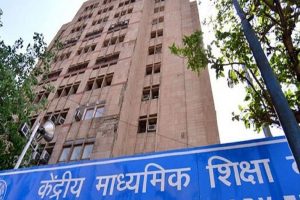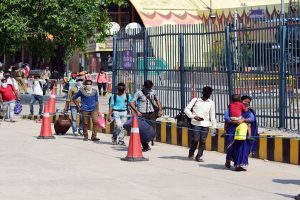THE TRIBUNE| New Delhi
India banned and criminalised manual scavenging in 1993, and 20 years later, the Prohibition of Employment as Manual Scavengers And their Rehabilitation Act, 2013 (PEMSR Act, 2013), expanded the scope of rehabilitating manual scavengers (over 95 per cent are Dalits) and their dependents by providing for cash assistance to a member of the household, voluntary skill development training, capital subsidy and concessional loans, and scholarships for children. It also mandated the formation of central and state-level committees to monitor and coordinate the implementation of the Act.
The top court’s comments came after petitioner Criminal Justice Society of India’s counsel Ashima Mandala said notice was issued in the matter in February 2019 and there were over 40 respondents but only 13 had filed replies so far. The Supreme Court on Monday said it will proceed with the hearing on a PIL against manual scavenging in India.
“We can’t compel people to file counter affidavit. We will proceed and draw an adverse inference against them,” said a Bench led by Chief Justice of India SA Bobde while listing the matter for further hearing in the third week of August.
The Department of Social Justice and Empowerment introduced the Self Employment Scheme for Rehabilitation of Manual Scavengers (SRMS) in 2007 to aid the rehabilitation of ‘former’ manual scavengers transitioning to other occupations. The Centre provides 100% of funds for the scheme, which is implemented by the National Safai Karamcharis Finance and Development Corporation.
One manual scavenger died every five days and the issue was also raised in the Rajya Sabha.
On February 8, 2019, the top court had asked the chief secretaries of all states and Union Territories (UTs) to place a record status report on the number of manual scavengers employed directly or indirectly since 1993 when the law prohibiting the practice was enacted.
It also sought a direction to states, UTs and the Indian Railways to investigate the death of manual scavengers and initiate criminal proceedings under IPC Section 304 (punishment for culpable homicide not amounting to murder) against authorities, agencies, contractors or any other official, who have directly or indirectly employed manual scavengers.
The death of persons under these circumstances cannot be attributed to mere negligence as these persons are engaged either directly or indirectly to carry out acts that are prohibited under the law and are exposing them to deplorable and hazardous conditions which have proved to be fatal in numerous instances, it said.
“Hence, it is the plea of the petitioner that the said contractors, officials, agencies or any other persons shall face criminal proceedings under section 304 of the Penal Code including the cases of agency wherein vicarious liability applies.” the plea said.
The matter is now adjourned for hearing in August 2021.
Image curtsey: IAS Express













Add Comment